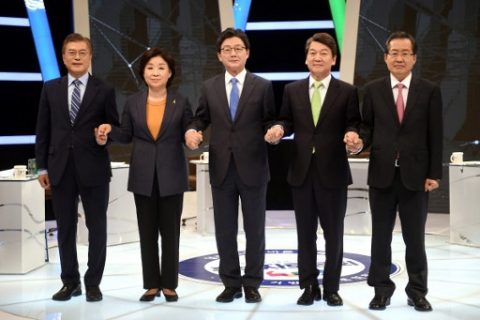
SEOUL, South Korea (AFP) — South Koreans went to the polls Tuesday to choose a new president after Park Geun-Hye was ousted and indicted for corruption, this against a backdrop of high tensions with the nuclear-armed North.
More than 139,000 voting stations opened at 6 am local time (2100 GMT) across the country under overcast skies, with turnout expected to hit a record high.
Voters have been galvanized by anger over the sprawling bribery and abuse-of-power scandal that brought down Park, which catalysed frustrations over jobs and slowing growth.
Left-leaning Moon Jae-In, a former human rights lawyer, has held a commanding lead in opinion polls for months, with the final Gallup Korea survey before a week-long pre-election blackout giving him 38 percent support, followed by former tech mogul Ahn Cheol-Soo on 20 percent.
Hong Joon-Pyo of Park’s Liberty Korea party languished in third place in the 13-strong field on 16 percent.
Chung Tae-Wan, a 72-year-old doctor, cast his ballot at a polling station in prosperous Seocho district in southern Seoul. “I voted for Hong, as security (against North Korea) is the most important thing,” he told AFP.
Kim Kyung-Min, 24, said she cast her ballot in advance last week. “I was so disappointed in Park and the establishment,” she told AFP, but refused to say whom she voted for.
The campaign has focused largely on the economy, with North Korea less prominent, but after a decade of conservative rule, a Moon victory could mean a sea change in Seoul’s approach toward both Pyongyang and key ally Washington.
The 64-year-old — who is accused of being soft on the North by his critics — has advocated dialogue to defuse tensions, and is seen to favor more independence in relations with the United States, Seoul’s security guarantor with 28,500 troops in the country.
Seoul needs to “take the lead on matters in the Korean peninsula” and South Koreans should not “take the back seat,” he said in a recent media interview.
The North has carried out two nuclear tests and a series of missile launches since the start of last year in its quest to develop a missile capable of delivering a nuclear warhead to the US mainland.
Washington has said military action was an option, sending fears of conflict spiralling.
More recently US President Donald Trump has softened his message, saying he would be “honored” to meet the North’s leader, Kim Jong-Un.
Moon has also said he would be willing to visit Pyongyang to meet Kim and advocated resumption of some of the inter-Korea projects shuttered by his predecessors, including the Kaesong joint industrial zone.
Myriad of challenges
But for many South Korean voters, corruption, slowing growth, unemployment, and even air pollution from China top the list of concerns.
South Korea’s rapid growth from the 1970s to 1990s pulled a war-ravaged nation out of poverty but slowed as the economy matured, and unemployment among under-30s is now at a record 10 percent.
Frustration over widening inequality in wealth and opportunities fueled anger over Park’s scandal, which exposed the cosy and corrupt ties between regulators and powerful family-oriented conglomerates, known as chaebols, that have endured for decades.
Park is awaiting trial over corruption for offering governmental favours to top businessmen — including Samsung heir Lee Jae-Yong — who bribed her secret confidante, Choi Soon-Sil.
Moon, Ahn and other candidates have both promised to reform the chaebols, which dominate the economy and have long been criticized for operating with little scrutiny from investors or regulators.
Another issue is relations with Beijing, which imposed a series of measures seen as economic retaliation over the deployment of a US anti-missile system, THAAD, in the South.
China is South Korea’s top trading partner — and also a major source of pollution.
In an editorial a day ahead of the vote, the JoongAng daily said the South’s next leader would have to steer the country “against a myriad of immediate and long-term challenges”.
“If we make the wrong judgment, we again will have to pay the price, as we have learned from our previous bad choices.”








